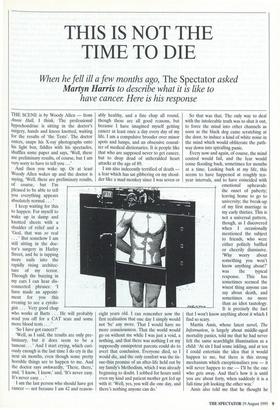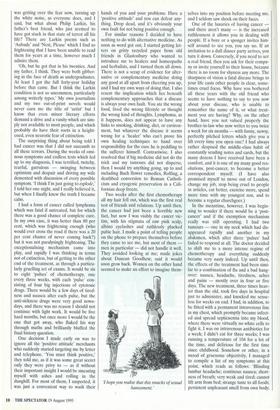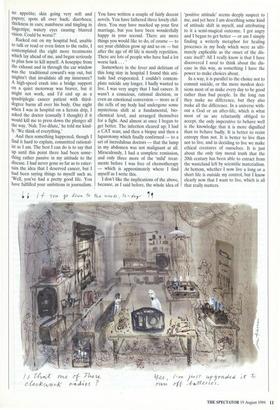THIS IS NOT THE TIME TO DIE
When he fell ill a few months ago, The Spectator asked
Marlyn Harris to describe what it is like to
have cancer Here is his response
THE SCENE is by Woody Allen — from Annie Hall, I think. The professional hypochondriac is sitting in the doctor's surgery, hands and knees knotted, waiting for the results of 'the Tests'. The doctor enters, snaps his X-ray photographs onto his light box, fiddles with his spectacles, shuffles some paper and says, 'Well, these are preliminary results, of course, but I am very sorry to have to tell you ... '
I keep waiting for this to happen. For myself to wake up in damp and knotted sheets with a shudder of relief and a 'God, that was so real . . . ' But somehow I am still sitting in the doc- tor's surgery in Harley Street, and he is tapping more nails into the rapidly rising architec- ture of my terror. Through the buzzing in my ears I can hear dis- connected phrases: 'I have made an appoint- ment for you this evening to see a cytolo- gist . . . Very good chap who works at Baits . . . He will probably send you off for a CAT scan and some more blood tests . . . '
'So I have got cancer?'
'Well, as I said, the results are only pre- liminary, but it does seem to be a tumour. . . ' And I start crying, which curi- ously enough is the last time I do cry in the next six months, even though some pretty horrible things are to happen to me. And the doctor says awkwardly, 'There, there,' and, 'I know, I know,' and, 'It's never easy. It's never easy. . . '
I am the last person who should have got cancer — not because I am 42 and reason- ably healthy, and a fine chap all round, though these are all good reasons, but because I have imagined myself getting cancer at least once a day every day of my life. I am a compulsive brooder over minor spots and lumps, and an obsessive consul- ter of medical dictionaries. It is people like that who are supposed never to get cancer, but to drop dead of unheralded heart attacks at the age of 89.
I am also indecently terrified of death — a fear which has sat gibbering on my shoul- der like a mad monkey since I was seven or eight years old. I can remember now the first realisation that one day I simply would not 'be' any more. That I would have no more consciousness. That the world would go on without me while I was just a void, a nothing, and that there was nothing I or my supposedly omnipotent parents could do to avert that conclusion. Everyone died, so I would die, and the only comfort was the tis- sue-thin promise of an after-life held out by my family's Methodism, which I was already beginning to doubt. I sobbed for hours until even my kind and patient mother got fed up with it: 'Well, yes, you will die one day, and there's nothing anyone can do.' So that was that. The only way to deal with the intolerable truth was to shut it out, to force the mind into other channels as soon as the black dog came scratching at the door, to induce a kind of white noise in the mind which would obliterate the path- way down into spiralling panic.
was the typical response. This has sometimes seemed the wisest thing anyone can say about death, and sometimes no more than an idiot tautology.
' It is precisely the fact that I won't know anything about it which I find so scary.
Martin Amis, whose latest novel, The Information, is largely about middle-aged mortality panics, told me that he had never felt the same searchlight illumination as a child: 'At six I had some inkling, and at ten I could entertain the idea that it would happen to me, but there is this strong mechanism which exceptionalises you — it will never happen to me — I'll be the one who gets away. And that's how it is until you are about forty, when suddenly it is a full-time job looking the other way.'
Amis also told me that he thought he was getting over the fear now, turning up the white noise, as everyone does, and I said, but what about Philip Larkin, his father's best friend, who just seemed to have got stuck in that state of terror all his life? There are Larkin poems such as 'Aubade' and 'Next, Please' which I find so frightening that I have been unable to read them for years at a time, however much I admire them.
'Oh, but he got that in his twenties. And my father, I think. They were both gibber- ing in the face of death as undergraduates.
At least I got the full forty-year holiday before that came. But I think the Larkin condition is not so uncommon, particularly among writerly types.' My own journalism and my two out-of-print novels would never earn me the title of 'artist' but I know that even minor literary efforts demand a drive and a vanity which are sim- ply not available to most people, and which probably do have their roots in a height- ened, even neurotic fear of extinction.
The surprising thing about being told I had cancer was that I did not succumb to all these terrors. During the weeks of omi- nous symptoms and endless tests which led up to my diagnosis, I was terrified, twitchy, tearful, garrulous — swinging between optimism and despair and driving my wife demented with discussion of every possible
symptom. 'I think I'm just going to explode,' I told her one night, and I really believed it, but when I finally knew the truth I became calm.
I had a form of cancer called lymphoma which was fatal if untreated, but for which there was a good chance of complete cure.
In my own case, it was better than 80 per cent, which was frightening enough (who would ever cross the road if there was a 20 per cent chance of never coming back?) but it was not paralysingly frightening. The exceptionalising mechanism came into play, and rapidly I was thinking in terms not of extinction, but of getting to the other end of the treatment, as through a particu- larly gruelling set of exams. It would be six to eight 'pulses' of chemotherapy, one every three weeks, with each 'pulse' con- sisting of four big injections of cytotodc drugs. There would be a few days of tired- ness and nausea after each pulse, but the anti-sickness drugs were very good nowa- days, and there was no reason I should not continue with light work. It would be five hard months, but once more I would be the one that got away, who fluked his way through maths and brilliantly bluffed the final history question.
One decision I made early on was to ignore all the 'positive attitude' merchants who suddenly started targeting me by letter and telephone. 'You must think positive,' they told me, as if it was some great secret only they were privy to — as if without their important insight I would be smearing myself with ashes and rolling in the dunghill. For most of them, I suspected, it was just a convenient way to wash their hands of you and your problems. Have a 'positive attitude' and you can defeat any- thing. Drop dead, and it's obviously your own fault for not being positive enough.
For similar reasons I decided to have nothing to do with alternative medicine. As soon as word got out, I started getting let- ters on gritty recycled paper from old friends in Glastonbury who wanted to introduce me to healers and homeopaths and herbalists, and I turned them all down. There is not a scrap of evidence for alter- native or complementary medicine doing any good at all apart from cheering you up, and I had my own ways of doing that. I also resent the implication which lies beneath complementary approaches that a disease is always your own fault. You ate the wrong food, lived the wrong lifestyle or thought the wrong kind of thoughts. Lymphoma, as it happens, does not appear to have any links to smoking, drinking, diet, or environ- ment, but whatever the disease it seems wrong for a 'healer' who can't prove his own healing techniques to hand over responsibility for the cure he is peddling to the sufferer himself. Contrariwise, I also resolved that if big medicine did not do the trick and my tumours did not disperse, then I would try anything going, up to and including Bach flower remedies, Rolfing, a deathbed conversion to Roman Catholi- cism and cryogenic preservation in a Cali- fornian deep freeze.
Two weeks after the first chemotherapy all my hair fell out, which was the first real test of friends and relations. Up until then, the cancer had just been a horrible new fact, but now I was visibly the cancer vic- tim, with his stigmata of raw pink scalp, albino eyelashes and ruthlessly plucked pubic hair. I made a point of telling people on the phone to prepare themselves before they came to see me, but most of them — men in particular — did not handle it well. They avoided looking at me; made jokes about Duncan Goodhew; said it would soon grow back. Women on the other hand seemed to make an effort to imagine them- 'I hope you realise that this smacks of sexual harassment.' selves into my position before meeting me, and I seldom saw shock on their faces.
One of the luxuries of having cancer — and there aren't many — is the increased ruthlessness it allows you in dealing with people. If a bore or a sponger invites him- self around to see you, you say no. If an invitation to a dull dinner party arrives, you turn it down. Conversely, if you need to see a real friend, then you ask for their compa- ny or invite yourself to their house, because there is no room for shyness any more. The sharpness of vision a fatal disease brings to your life casts other people in clear, some- times cruel focus. Why have you bothered all these years with the old friend who seems to have nothing to say to you now about your disease, who is unable to remember the name of it, or what treat- ment you are having? Why, on the other hand, have you not valued properly the brother-in-law who now writes to you twice a week for six months — with funny, newsy, perfectly pitched letters which give you a lift every time you open one? I had always rather despised the middle-class habit of constantly sending notes and cards, but the many dozens I have received have been a comfort, and it is one of my many good res- olutions, post-cancer, to become a better correspondent myself. (I have also promised myself to move out of London, change my job, stop being cruel to people in articles, eat better, exercise more, spend more time with my youngest son, and to become a regular churchgoer.) In the meantime, however, I was begin- ning to wonder if there would be a 'post- cancer' and if the exemption mechanism really was still operating. I had two tumours — one in my neck which had dis- appeared rapidly and another in my abdomen, which after three 'pulses' had failed to respond at all. The doctor decided to shift me to a more intense regime of chemotherapy and everything suddenly became very nasty indeed. Up until then, the effects of the treatment had been simi- lar to a combination of flu and a bad hang- over: nausea, headache, tiredness, aches and pains — mostly over in four or five days. The new treatment, three times heav- ier than the old, took five days in hospital just to administer, and knocked me sense- less for weeks on end. I had, in addition, to be fitted with a permanent intravenous line in my chest, which promptly became infect- ed and spread septicaemia into my blood, where there were virtually no white cells to fight it. I was on intravenous antibiotics for a week; I didn't eat for three weeks; I was running a temperature of 104 for a lot of the time, and delirious for the first time since childhood. Somehow or other, in a mood of gruesome objectivity, I managed
to compile a list of my symptoms at this point, which reads as follows: 'Blinding lumbar headache; continous nausea; short- ness of breath; very weak and tired; cannot lift arm from bed; strange taste to all foods; persistent unpleasant smell from own body; no appetite; skin going very soft and papery; spots all over back; diarrhoea; thickness in ears; numbness and tingling in fingertips; watery eyes causing blurred vision. Could be worse?'
Racked out on my hospital bed, unable to talk or read or even listen to the radio, I contemplated the eight more treatments which lay ahead of me, and began seriously to plan how to kill myself. A hosepipe from the exhaust and in through the car window was the traditional coward's way out, but mightn't that invalidate all my insurance? A high-speed crash into a bridge support on a quiet motorway was braver, but it might not work, and I'd end up as a quadriplegic cancer patient with third- degree burns all over his body. One night when I was in hospital on a heroin drip, I asked the doctor (casually I thought) if it would kill me to press down the plunger all the way. `Nah. Too dilute,' he told me kind- ly. 'We think of everything.'
And then something happened, though I find it hard to explain, committed rational- ist as I am. The best I can do is to say that up until this point there had been some- thing rather passive in my attitude to the disease. I had never gone so far as to enter- tain the idea that I deserved cancer, but I had been saying things to myself such as, 'Well, you've had a pretty good life. You have fulfilled your ambitions in journalism. You have written a couple of fairly decent novels. You have fathered three lovely chil- dren. You may have mucked up your first marriage, but you have been wonderfully happy in your second. There are more things you would like to do, of course — to see your children grow up and so on — but after the age of 40 life is mostly repetition. There are lots of people who have had a lot worse luck . . . '
Somewhere in the fever and delirium of this long stay in hospital I found this atti- tude had evaporated. I couldn't contem- plate suicide any longer. I badly wanted to live. I was very angry that I had cancer. It wasn't a conscious, rational decision, or even an emotional conversion — more as if the cells of my body had undergone some mysterious shift at a fundamental, bio- chemical level, and arranged themselves for a fight. And almost at once I began to get better. The infection cleared up; I had a CAT scan; and then a biopsy and then a laparotomy which finally confirmed — to a set of incredulous doctors — that the lump in my abdomen was not malignant at all. Miraculously, I had a complete remission, and only three more of the 'mild' treat- ments before I was free of chemotherapy — which is approximately where I find myself as I write this.
I don't like the implications of the above, because, as I said before, the whole idea of 'positive attitude' seems deeply suspect to me, and yet here I am describing some kind of attitude shift in myself, and attributing to it a semi-magical outcome. I got angry and I began to get better — or am I simply finding a writerly metaphor for healing processes in my body which were as ulti- mately explicable as the onset of the dis- ease itself? All I really know is that I have discovered I need to think about the dis- ease in this way, as something I have the power to make choices about.
In a way, it is parallel to the choice not to commit suicide, or the more modest deci- sions most of us make every day to be good rather than bad people. In the long run they make no difference, but they also make all the difference. In a universe with- out a God or an after-life, which is what most of us are reluctantly obliged to accept, the only imperative to behave well is the knowledge that it is more dignified than to behave badly. It is better to resist entropy than not. It is better to live than not to live, and in deciding to live we make ethical creatures of ourselves. It is just about the only tiny moral truth that the 20th century has been able to extract from the wasteland left by scientific materialism. At bottom, whether I now live a long or a short life is outside my control, but I know clearly now that I want to live, which is all that really matters.




















































 Previous page
Previous page